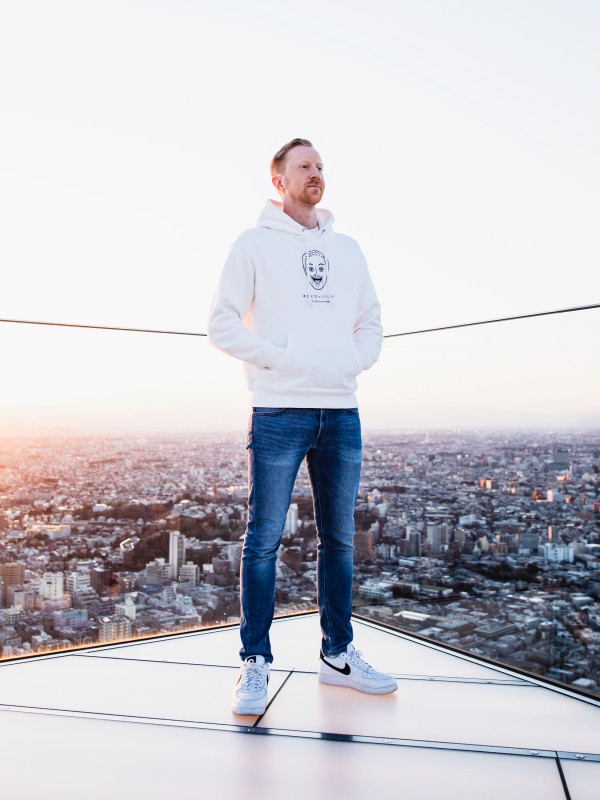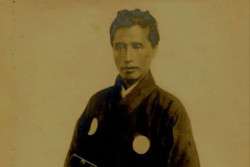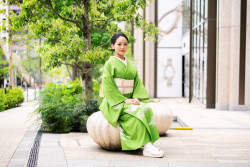
January 20, 2025
Mr Yabatan’s Journey From Norway to Japanese Comedy Stardom
How a Norwegian content creator became a beloved face in Japan's comedy scene
By Gendel Gento
Meet Mr Yabatan—a Norwegian-born comedian and video creator with a knack for turning everyday moments in Japan into laugh-out-loud content. Hailing from Oslo and now based in Tokyo, Yabatan seems destined for the spotlight. Thanks to his father, a musician and TV producer who worked in stand-up comedy, Yabatan had access to cameras, props and all the tools a budding entertainer could dream of, sparking his love for the craft early on.
As a kid, Yabatan was constantly filming videos and creating comedic skits. After acting school, he dabbled in radio and TV gigs, but it wasn’t until the rise of vlogging and social media that his humor found its audience. Moving to Japan proved to be the turning point, propelling his career to new heights as he brought laughter to people across cultures.
Earlier this winter, I met Yabatan in the trendy Tokyo expat haven of Hiroo for a laid-back interview about life and comedy in Japan.
Metropolis: What made you leave Norway for Japan?
Yabatan: I’ve always been interested in acting, comedy and making people laugh. I first discovered Japanese comedy in high school when I saw the TV show Downtown no Gaki no Tsukai ya Arahende!! (Downtown’s We Aren’t Errand Boys!) and their no-laughing challenges on YouTube.
I was fascinated by the unique humor and the creativity. I had never seen anything like it and thought it was hilarious. From watching Japanese comedy I became interested in Japan’s culture and language, and decided to try and get into the Japanese entertainment industry.
I started watching Japanese movies, listening to music and eventually traveled to Japan to see what it’s like. Since I was in high school and didn’t have much money, I had to save up. Finally, I came to Japan for the first time on a trip with friends when I was 19 in 2012. And it was amazing! The people were so friendly, the culture was really strong and the language was beautiful.
But I thought to myself–– is it really like that? I wanted to try and live here and see what it’s like for real. I love a challenge and always need to do something new. Wouldn’t it be awesome to make Japanese people laugh, in Japanese, as a foreigner? So, three months after that Japan trip, I decided to come back and enroll in a Japanese language school for six months.

M: How was your experience in language school?
Y: It was really cool. Obviously, it was also tough because I was on my own. Fortunately, I made one friend during my previous trip, so I contacted him. My school was in Takadanobaba and he was a Waseda University student so he was always in the area. He couldn’t speak any English and I couldn’t speak any Japanese. I have no idea how we managed to communicate (laughs). But it put me in a situation where I had to speak Japanese.
I spent my time hanging around in a bar that was run as a university club by students, and they also had a cafe which is still there, called 10°CAFE. Many Japanese people came in and helped me with my studies. So I quickly got into the Japanese way of living. But I went back to Norway after finishing school.
You might also like reading: Takadanobaba Ultimate Food Guide: A Tokyo College Town
M: How did you get started making content in Japanese?
Y: I started with Vine––remember that? The six-second video-sharing service from Twitter. They ended up shutting it down, but it was catching on at the time. However, I never posted most of those videos, and I’m so glad I didn’t because it wasn’t the right time. I didn’t have enough knowledge so it wouldn’t have led anywhere. I wouldn’t be proud of that content today.
During that time I came back to Japan on a working holiday visa hoping to become an actor. I quickly discovered that it would be harder than I expected––as it turns out, many foreigners were doing the same thing. So, I joined an agency and landed some auditions, but it was always for roles as the foreigner in a commercial or something, and I realized that wasn’t what I wanted to do. My goal was not to be “the foreigner,” I wanted to be a Japanese comedian.
But I was running out of money, so I moved to a sharehouse in Kamikitazawa and started looking for jobs. I got a job at an eikaiwa (English conversation school) that started super early in the morning, like 6am, so I could finish work at 2pm and had the rest of the day to make videos. Around that time, the people in the sharehouse found my account and said it was funny. Then one of my videos went viral in Australia, which was the spark I needed. It gave me the confidence to keep making videos. But while I had the attention of foreigners, I wanted to make Japanese people laugh (laughs).

M: So when did your breakthrough in Japan come?
Y: In December 2017, I finally reached Japanese viewers. I made a video about a foreigner experiencing Japanese Christmas lights for the first time and posted it on Instagram. At first, nothing happened. Then, three days later, I was back in the same spot, and my phone started blowing up with notifications. There were so many Instagram alerts, and I thought, “Oh my God, what’s happening?” When I checked my DMs, they were full of Japanese comments saying, “You’re so funny!” My friends messaged me, telling me I was all over Twitter.
What happened was that someone had taken my video from Instagram and posted it on Twitter. Then another person linked my Instagram account, and the video blew up in Japan. It was pure luck—it wasn’t anyone famous who shared it, just someone who thought it was funny.
That week, everything changed because of that one video. It was crazy how fast it all happened—I wasn’t ready for it at all. People even started coming to my eikaiwa, and at the end of the lesson, they’d tell me, “I only came here to see you.” That was so surreal (laughs).
M: How do you tailor your content to a Japanese audience?
Y: When I came to Japan, I decided to reset my perspective. I wanted to start fresh and understand what Japanese people find funny, how they think and what resonates with them. Instead of questioning everything, I chose to accept it and take it all in. I use this understanding in my videos to make them funny and engaging for a Japanese audience.
I draw inspiration from the language and everyday life in Japan to create humorous situations. At the same time, with social media connecting us to a global audience, many foreign fans also enjoy my content.
M: What are the differences between comedy in Japan and Norway (or in other words, Japan vs the West)?
Y: Humor is, of course, subjective––everyone has their own sense of humor. But in my opinion, Japanese humor often focuses on creativity and originality, striving to create something new or better than others. The more unique you can be, the better. A simple example is batsu games, those wild challenge shows where people climb slimy walls or do other absurd tasks. Interestingly, when I talk to Norwegian TV companies these days, they’re eager to make shows like that, even though Japan stopped producing them years ago.
In the West, I feel like humor tends to focus more on daily life and problems, often leaning toward criticism or satire. In my country, I feel like most of the humor is simplistic, relying on sexual jokes as an easy way to get laughs. Making fun of others is another big theme, which you rarely see in Japan. That said, I do enjoy humor like The Office and other comedy dramas that make you cringe with irony. Irony, though, isn’t really part of Japanese culture, in my experience.
Recently, I think the challenge with Western comedy is that it pushes for total freedom to joke about anything. While I understand that perspective, is it really necessary to make fun of certain stereotypes for a laugh? Making fun of someone’s appearance, hurting other people because of the way they look doesn’t feel like true comedy to me. You can make a great joke without putting someone down or attacking them.
And that’s what I love about Japanese comedy–– it’s more situational. It’s about creating funny scenarios rather than hurting or belittling anyone. It’s incredibly creative and refreshing.

M: How did you come up with the character of Mr Yabatan?
Y: It all started with making parodies of foreigners speaking Japanese. One of the characters I created was a Frenchman with a strong French accent, which I quickly realized Japanese audiences found hilarious. So, I decided to go with it. If you watch my older videos, you’ll notice that my voice pitch was much lower than it is now. That’s something I intentionally changed––or maybe it happened naturally––because in Japanese comedy, the louder and more energetic you are, the better.
On a broader level, I started creating this content because I was tired of seeing the West interviewing Japanese people from afar. I was like, why does it have to be like that? Japanese people are people––they’re not Pikachu! So I just grab my camera, stand next to people and have a conversation with them. It’s really not that complicated.
M: How is Yabatan different from your real self? And how are you alike?
Y: The biggest difference is that in my private life, I’m much calmer, I speak in a normal voice and I enjoy reflecting on things. Yabatan, on the other hand, doesn’t think too much (laughs). When I’m Yabatan, I can be this outgoing, super friendly, funny guy who makes people laugh. He’s never sad––always happy and positive.
In real life, though, life happens. I have days when I’m not feeling great, but then I go outside, and someone recognizes me. As soon as that happens, I automatically smile, and seeing their smile in return lifts my mood. It makes me happy even when I’m down. That said, Yabatan is still a huge part of who I am. We’re both ambitious. We love talking to different kinds of people, learning about their lives and cultures and exploring new places. In that way, we are very similar.
M: Where does your catchphrase Honto ni bikkurishita! (I was really surprised!) come from?
Y: The catchphrase comes from being surprised at different things in Japan or Japanese culture. But the origin of that sentence came because when I first started making videos I couldn’t speak much Japanese, so my vocabulary was limited. “Honto ni bikkurishita!” was a phrase I learned early on because I was often surprised by the different things Japan has to offer. So it happened naturally with my vocabulary at the time.
M: After all these years, can Japan still surprise you?
Y: Japan will always surprise me! That’s the cool thing about Japan, there’s always something unexpected or unique to discover. But I must admit it doesn’t happen as often anymore. Once you live here for a certain amount of years, it wears off a bit.
It helps when friends visit, and I see their reactions to different things in Japan––it brings me back and reminds me of what it felt like when I first experienced them. Things like the changing seasons, the vibrant leaves and the colors. Many people mention how quiet it can be, even in the middle of Tokyo. And I’m like, really? (laughs). But maybe they’re right.
M: Any plans to branch out from content creation? How about upcoming projects?
Y: I really enjoy making different content and exploring new ways to make Yabatan videos, but I do enjoy things like production and organizing events, as well. So I have different side projects that I’m working on.
An upcoming project is an event with Japanese and foreign creators, celebrities, producers and marketing professionals in the industry, coming together for a “Norway night” sponsored by different Norwegian companies in Japan. I love connecting people together. For example, there are a lot of international YouTubers in Japan, but they are not in the Japanese entertainment industry, and the industry doesn’t interact with them because of barriers like language and culture. If you bring these people together you can make great things happen for both communities and for audiences as well.
M: Do you have a long-term career/life plan in Japan? What does the future look like?
Y: You never know what the future holds. However, I’m a big fan of planning so I do have a plan, but I won’t tell you (laughs). Maybe you’ll see a different side of me in the coming years.
That said, the future looks like a lot of fun! It’s so important to have fun along the way. For me, making people laugh is the foundation and then I go from there. Everything else is a bonus.
You might also find these articles interesting:







